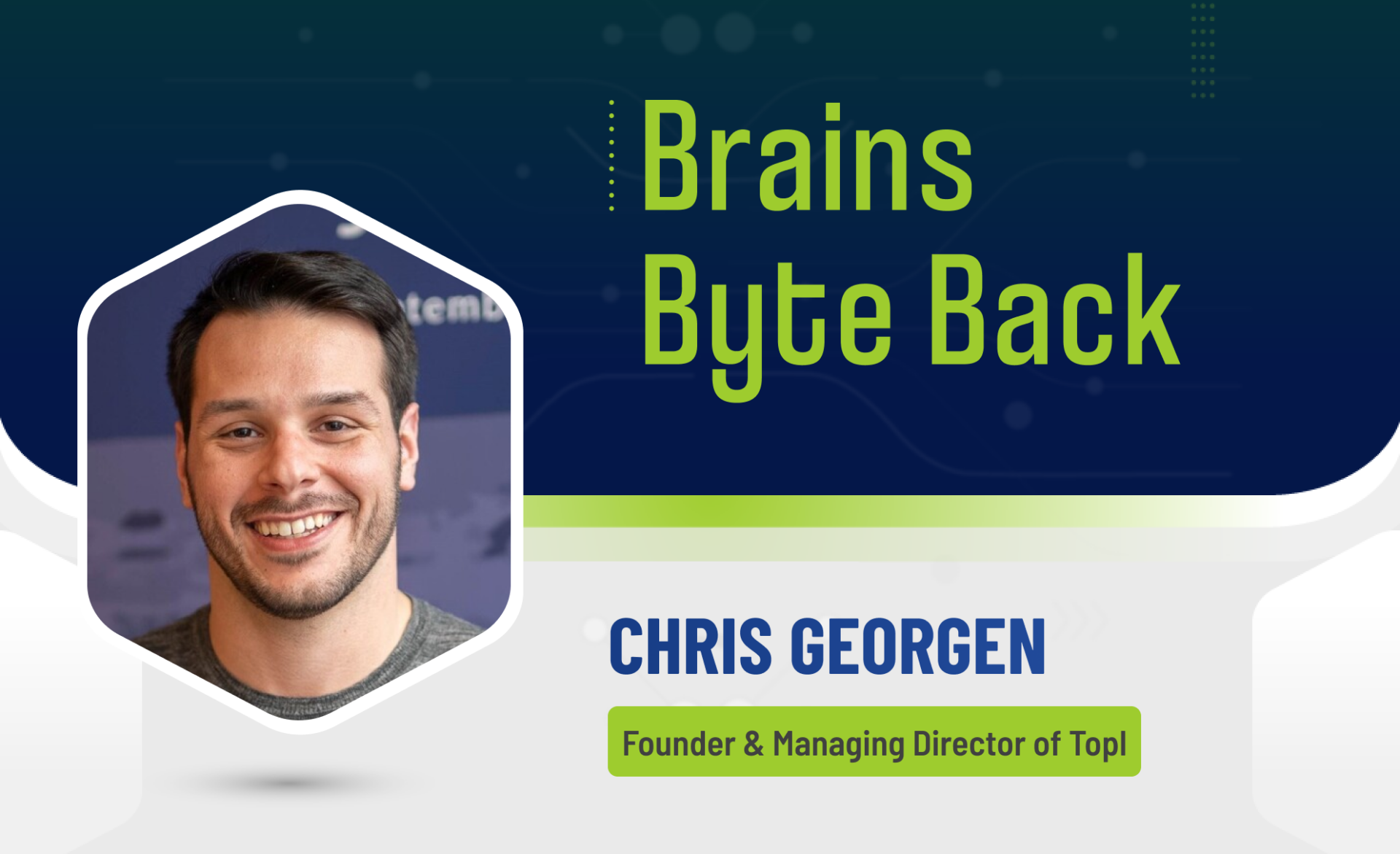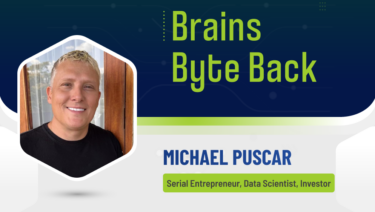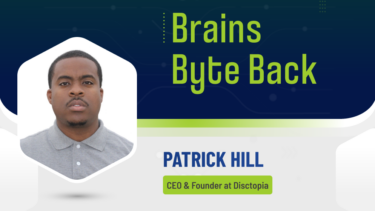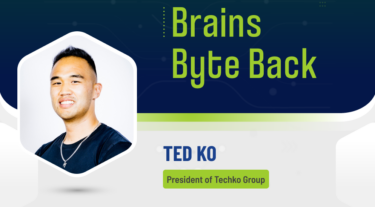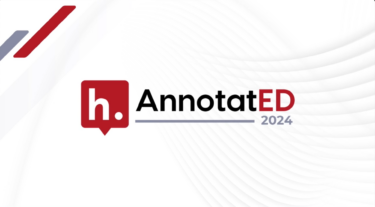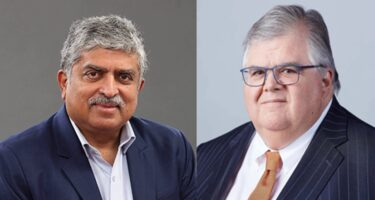When the subject of blockchain technology comes up, it can be easy to get swept away with headlines focusing on cryptocurrencies such as Bitcoin and Ethereum. However, this technology holds far more value than underpinning cryptocurrencies, and in this episode, we will explore how blockchain technology is being used to create a fairer, more sustainable world.
To discuss this, we spoke with Chris Georgen, Founder & Managing Director of Topl, an impact-focused, ESG-first company that helps corporations track, tokenize, and transact positive impact.
You can listen to the episode below, or on Spotify, Anchor, Apple Podcasts, Breaker, Google Podcasts, Stitcher, Overcast, Listen Notes, PodBean, and Radio Public.
Alternatively, you can find a transcript below:
Chris: Thanks for all this Sam. So my name is Chris Georgen. I’ve been in the web three space in one form or another going on 10 or 11 years now first got involved in 2012. Topl is the second crypto second web three venture I’ve been engaged with personally. So I’m one of its two co-founders. And I act as our Managing Director, really meaning that I oversee the strategic vision, I oversee a lot of things to do with our tokenomics and the new verticals. And the new use cases that we are constantly exploring and constantly working to build out what Topl is at least the short version, we are a new and a modular, depending on your definition, either layer zero or layer one that is focused around impact and emerging markets. So we’ve really built a new blockchain protocol, effectively from scratch to do everything from powering the next generation of carbon markets to powering global supply chains, especially those supply chains that affect or originate in the global south or in disenfranchised rural communities, though, you know, that’s everything from coffee to conflict-free diamonds, to really all sorts of agricultural products. And then we’re starting to play in the financial inclusion space, as well. But again, all through this idea of how would you optimize? How would you build a blockchain for positive impact?
Sam: Awesome, fantastic. Well, thank you so much for coming on the show. It seems like you folks are doing some really interesting stuff in the space of sustainability, and inclusion growth. And yeah, I’m super happy to or excited really to talk about this. But before we get into anything else, I would love to know like how the Topl begin?
Chris: Yeah, so So Topl began, really in the in the tail end, actually, of the previous web three venture that I had founded. Previously, I was more involved on like the FinTech side of the web three space, we were doing retail payments for local businesses, food trucks, coffee shops, things like that we had been building out on the Ethereum blockchain. And then through that process, I learned, I think, two very important lessons that really then went into the founding of Topl. The first lesson was, when technology is as new when technology is complicated as blockchain, it can be really difficult to build on top of something that might not have your priorities in mind. So Etherium, for all its great use cases, especially early on fast retail payments, definitely, you know, did not really crack the top 20 things that I think the the core development teams were thinking about. So having that alignment was was a bit of a challenge. And then the other thing I learned is there are a lot of watching web three use cases that are they’re kind of neat, they’re kind of fun. People will be like, Oh, that’s cool. But they’re not necessarily all that valuable. And those were the two lessons that I took away from my first venture and really brought into Topl. But the way that Topl got brought into all of these sustainability conversations, the way I got brought into these conversations is, I was fortunate enough to have some pretty good contacts in the development, finance and the sustainable finance space. So when different development banks or when the World Bank or when the UN was starting to kick off some of these working groups, from probably about 2015 to 2017, looking at bringing new technologies into their processes, I was lucky enough to be brought in as one of the blockchain experts. And I was almost always able to answer in the affirmative, that yes, blockchain technology is a is a good tool for some of the problems that you’re identifying. The question then, that I wasn’t able to answer is well, okay, which blockchain should we be using for this? And trying to answer that question is, is where topple came from? So we got started slowly, in 2017 2018, we raised our first funding in 2019, and then really started to accelerate and build out the team.
Sam: Awesome. Well, congratulations on all the success you’ve seen up until now. And it’s cool to see that you previously did something else which led on to this, we see that a lot with the startups that we speak to hear where they’ll go into one thing, and then it has like a domino effect into going into something else. So it’s cool. It’s crazy how those things can just lead on from one to another. But before we go any further I do really want to know like, Where did the name Topl come from? What’s the story behind that? Because like for our listeners, if that aren’t familiar, it’s like T O P L. So it’s like, not a very conventional way of saying topple I guess or spelling.
Chris: Yeah, so one of my, one of my degrees, or one of my field of fields of study was in mathematics back when I was over at university. And there’s this field of mathematics known as topology has some relevance in in material science and physics as well. But topology as a field kind of relates to how things. These are interconnected or how systems can communicate to each other how you can move information from from like point A to point B, there’s materials that you can create that are topological, there’s again, like a whole branch of mathematics called topology. And since blockchains are really all about how we connect things, or how we think about reshaping systems from a centralised way of being to a distributed or eventually decentralised way of being, we thought there was a lot of relevance there. And we’ve kind of always fancied ourselves as a little bit nerdy, a little bit quirky. And we wanted to, to pull on some fun ideas, some more core ideas to the blockchain movement, as we were picking a name for for our company. And then the other piece of it was we really liked the idea of that playfulness, of toppling over existing systems toppling over the way things have always been done, you know, just through this lens of generally being disruptive. And then what we did is we just did, I think, like a lot of startups do, we figured out a way to to shorten the word, drop some vowels and spell it in a somewhat unique way to turn it into a startup name.
Sam: Yeah, I definitely get the startup name vibe from that, I can see that immediately. And you know what, I’m so pleased that you said that last part, because that’s exactly what I interpreted it from it when I see top or I think of like, certainly from the perspective of what you’re doing. The first thing that came to mind is, like I assumed, like to topple a regime or to topple or to overthrow something which is currently in place, which maybe is somewhat corrupt or undesirable. So personally, I can say that like this, this underlying message, I mean, I’m not gonna lie. I didn’t get the mathematics part. But that’s not a speciality of mine. So I’m not too fussed about that. But yeah, definitely the second part, it like really resonated with me.
Chris: Yeah, and you know, just that idea of like being able to have dual meanings have dual explanations for it really just made it a winner for us, as we were, you know, going through dozens and dozens of different name iterations, actually, over one Christmas holiday a couple of years ago.
Sam: That’s awesome. Well, I love what you decided there. And to get more into the discussion that I really wanted to speak about today, sustainability and inclusive growth through new economic systems. I did actually see that previously in an interview with authority magazine, that you’ve been taking some like big steps in this space, you’ve already mentioned on the show. And I think you mentioned a few of them already, earlier today in this call. But like, for example, I know you’re using Blockchain technology to track and verify conflict free diamonds, and fair wage, coffee and chocolates alongside issuing and securing nature based carbon credits. Can you share how topple is doing this? And perhaps other examples that highlight the work that you’re doing in this space?
Chris: Yeah, absolutely. So the way that we think about, you know, really picking the problems that that we want to tackle or picking the problems that we think our technology is well suited to, we really look at it through this lens of where is their lack of trust? Where is there a need for transparency? Or where is there the potential to create a new, more liquid, and just kind of more open and broad reaching market than than exists? Because to us, those are really the qualifiers are, those are really the things that you need to look for, if you’re going to try to implement blockchain technology, you know, there’s obviously so much hype in the space, so much excitement. But unfortunately, that also means there’s a lot of, you know, not great adaptations of the technology, or, you know, a fair number of use cases where, well, yes, you can do that with Blockchain technology, but you don’t really need to. And so that was that sort of thinking is really what pushed us in the direction of supply chains first. And the way that we think about implementing along some of these supply chains is we asked the question, what type of data do we need to gather? And therefore, what is the best way to gather that information? Once we have that question answered, we know what sort of partnerships we need in order to to implement these things. So for example, in a lot of the agriculture work that we do, and this ranges from everything, coffee, chocolates, tea, spices, a number of other, you know, high value agricultural commodities, there’s a lot of interest in what wages are farmers being paid. And since that’s really the like, the core piece of data, or the core question that needs to be answered, needs to be proven out and then ultimately needs to be relayed in a verifiable manner to buyers and consumers. We say, All right, well, let’s go find a group that can develop a mobile application that farmers will actually be able to use or develop just kind of like an SMS protocol, where the technology just pings out and says, Is this is this the price that you were actually paid for it? So you know, the shipment would get logged or something like that, and then a farmer would just be asked through, again, something as simple as an SMS. Was this you that made the transaction and is this the price that you were paid for it. And so when we’re thinking about some of that stuff, we think SMS and we think, simplest technology that you can use to get it into the hands of rural communities. And other times we’re thinking through Internet of Things, integrations. So when we are doing some of our diamond work, we partnered with about 30 mines in South Africa, and a number of jewellers, actually here in Texas. And for that project, it was all about integrating the technology with all of the big industrial machinery that’s already involved in the diamond, the diamond mining process, so we’re able to get pictures, we’re able to get like snapshots of data directly from the mind site. So we can pull that data out and actually be able to share that halfway around the world halfway around, you know, from one continent to another, those, that’s how we think about some of the supply chain use cases. Beyond that, we’ve started to get involved actually, with sustainable timber. And as we’re thinking through some of those projects, it actually weeds very naturally into some of the things that we’re doing in the carbon space. And this real cool idea of almost like intersectionality, between different use cases where we’re starting to track sustainable timber and its usage. And then because that’s timber is sustainably harvested because it’s been then replanted, you know, those forests are being regrown, you’re actually able to start treating the buildings that use that timber almost as carbon sinks. So you’ve got the supply chain integration on one side, and then you’re using that data to be able to actually tie carbon credits to the existence of these new buildings, for example. And those are some of the areas that we think blockchain technology can be really excited where you’re like, starting in one vertical or one use case and then you’re repurposing that data into an entirely different use case, supply chain all the way through to to minting carbon credits.
Sam: That’s awesome. And it’s so wonderful to see like this technology be used in such a positive sense. And it’s not just for, like, just diamonds, as you said, but also lumber, and it seems like such a versatile technology that can be used in so many spaces. And I’d really like to know like, even beyond sustainability, what excites you the most when you think of the impact blockchain technology will have on our future as a society?
Chris: Oh, yeah, there’s so many different things there. One, one thing that we’re already thinking a lot about, and actually onboarding a number of partners for is this idea that we have of trying to generalise carbon credits. So you know, despite the fact that in the in the global scale of things, you know, that several bill or the couple of billion dollars that exist in like the voluntary carbon markets, still not that enormous, you know, compared to a lot of our other financial instruments that exists in the world, but, you know, it’s growing people understand the idea of carbon credits. And I think in a lot of ways, it is, you know, a huge success story when we think of impact focused financing, and just this idea of financial innovation, to have a form of positive impact. And what we’re trying to do is we’re asking the question of, can you generalise that idea of a carbon credit, like a unit of carbon that you can create a market around, you can buy and sell, you can claim you can retire, all of these things that you can do with a carbon credit? Can you also do that for other areas of positive impact? And we said, hey, let’s go bring on partners. We tried to get as many partners as we can to represent, you know, basically all 17 UN SDGs, the Sustainable Development Goals, that’s just used as a rough heuristic. And we brought in those partners, and we said, all right, how are you thinking about impact? And is there a way that we can turn that impact into a token, and then we can create a market around that, around that token, because as I was exposed to and Sam, you might have a very similar experience, as I was exposed to the impact and the sustainable financing space, this idea of sustainability, not sustainability from like a planet perspective, but sustainability from an economic perspective, was really one of the big things that everyone is really focused on. How can I break free from that cycle of philanthropic donations and needing to raise fresh money every year? How can we think through like new financial innovations to make these like, again, this impact financing the sustainable financing, like literally just self reinforcing, self growing and create a flywheel around it? This idea of new markets we think is perfect for for the technology. We’re building.
Sam: Well, it certainly sounds very promising. And I look forward to seeing what you develop in this space. And I know that you kind of touched on your future intentions, there were security partners. But that aside, what is on the horizon view of folks like what’s a top priority for Topl in the next like six months, a year, five years, what’s the plan look like for you?
Chris: This is probably going to be Topl’s most exciting year to date. And you know, quite quite honestly, maybe it’s the most exciting year, even in its history going forward. A big, big milestone for any blockchain project is when it chooses to decentralise or when it chooses to, you know, turn over its governance turn it over. It’s it’s a vision to the community that it has been building. Because we’ve always fallen into the school of thought that says, if you’re really going to get the value, and you know the true promise of blockchain technology, you need to treat everything about yourself in a way that is decentralised, treat everything about yourself as being inclusive. And that you know, very much includes the the economic interests of the project, as well as the decision making interests of the project. And so this will be the year that Apple actually goes through that process. And we kind of transform ourselves from this, you know, very traditional looking company that’s doing very exciting things technologically into something that is going to have decentralised governance is going to be something that is like truly community forward in how our vision is set, how we’re governed, how decisions get made, how incentives play out. So this will be the year of our decentralisation event, some people call it a TGE or a token generation event, because you know, you do the governance, you do the economics, just you know, through tokens, usually that’s how we do things in the blockchain space. But that’s, that’s the big thing for us this year, which we are incredibly excited about. It’s, it’s going to be a big lift, it’s going to involve, you know, internal things, external things, but it’s quite exciting. And we think we’ve got some pretty novel ideas, to really make sure that when we do that transformation, it is as inclusive and as community forward as one can possibly be.
Sam: Well, I love your inspiration and enthusiasm for 2023. And I’m really rooting for you, folks. And I hope that you’re able to expand on the work that you’re doing. And if people are interested in keeping up with you folks or reaching out to you, what’s the best way for them to reach out to you potentially Chris, or just keep up in general with the work Topl is doing
Chris: So the two most active channels, we’re doing a lot on on Twitter kind of just as a way to coordinate the community. But where all these conversations are happening, and where we are, you know, soliciting things from the community is we have a discord. And that is where we are finding new projects, answering questions, you know, bringing people in to say, hey, we’ve got this new idea. What does everyone think about it? So we’ll share those links, so that you can share them as well. But a footer? I’m on there, the company’s on there, and then our Discord as well. And we’ll share those links.
Sam: Fantastic. Yeah. So there’ll be those links within the show notes, so you’ll be able to find them there. But otherwise, Chris, thank you so much for joining me. It’s been a real pleasure learning about the work that you folks are doing, and I sincerely hope that you’re able to expand, keep growing and just do more good in the world.
Chris: Thanks for having me on Sam. I appreciate it.



